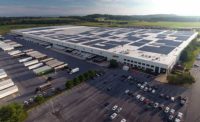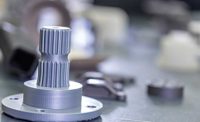Five Things: Truck Manufacturing








1. // Daimler Truck Prepares for Series Production of Fuel Cells
Daimler Truck has created a new subsidiary, Daimler Truck Fuel Cell, to mass-produce fuel cells for heavy trucks, energy storage and other applications. The company is investing in new, state-of-the-art facilities that will cover every stage of fuel cell production, including membrane coating, stack manufacturing and final assembly.
“We are in position to work on one of our most important milestones: the technological template for series production of fuel cell systems on an industrial scale,” says Andreas Gorbach, head of Daimler Truck Fuel Cell.
Fuel cell production is a highly complex process. Delicate components must be produced and assembled to micron tolerances in clean room conditions. Even the smallest contamination could impair the cells’ functionality, and slight fluctuations in temperature and humidity can adversely affect the materials.
2. // Navistar Defense to Upgrade Mississippi Assembly Plant
Military vehicle manufacturer Navistar Defense will invest $8 million to upgrade its assembly plant in West Point, MS. The company also plans to add 500 new jobs by 2024.
The plant has been the company’s primary manufacturing site since 2006. The 562,000 square foot facility houses five multipurpose, moving assembly lines. It has manufactured tens of thousands of vehicles since 2006.
Headquartered in Melrose Park, IL, Navistar Defense manufactures and services tactical wheeled and commercial off-the-shelf military vehicles for the U.S. government and NATO allies. The company has contracts in place to ensure long-term operations at the West Point plant.
3. // Mack Trucks Completes $84M Makeover of Assembly Plant
Mack Trucks has completed an $84 million renovation project at its assembly plant at Macungie, PA.
Upgrades included a 300,000 square-foot expansion to improve material flow, installation of new equipment and tooling, implementation of new manufacturing IT systems, and construction of a new audit building equipped with stalls and test pads for quality checks on completed vehicles. A significant component of the project was the insourcing of chassis assembly to better manage the process.
Also included in the project is a new 20,000 square-foot building for a Customer Adaptation Center and to support a new electric truck that will be introduced in 2021.
4. // Toyota, Hino to Develop Truck Powered by Fuel Cells
Toyota Motor North America and Hino Trucks have agreed to jointly develop a Class 8 fuel cell electric truck (FCET) for the North American market.
The initiative will pair Hino’s newly developed Hino XL Series chassis with Toyota’s fuel cell technology. This collaboration expands upon an existing effort to develop a 25-ton FCET for the Japanese market. The initial demonstration vehicle is expected to arrive in the first half of 2021.
5. // $430 Billion
Global sales of heavy duty trucks are expected to grow at a cumulative annual rate of 4 percent during the next six years, topping $430 billion in 2026, according to Global Market Insights Inc.
Looking for a reprint of this article?
From high-res PDFs to custom plaques, order your copy today!










